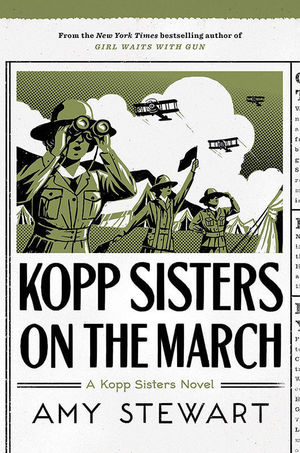When the anxiety-inducing daily headlines of today become too much, I like to turn to news of the past, particularly if it’s wrapped in engrossing fiction.
Some of my favorite turn-to escapes are the Kopp Sisters novels by author Amy Stewart.

Although the books are fiction, the characters are based on the real lives of the Kopp family, who lived in New Jersey in the early 20th century. Stewart first learned about the three sisters in vintage newspaper articles, then explored their lives in detail through genealogical records, court documents and other sources.
The sisters are Constance, the thirtysomething eldest, whose knack for solving crimes gets her hired as the first “lady deputy sheriff” in New Jersey; Norma, who prefers a quiet life working on the family farm and raising homing pigeons; and Fleurette, a vivacious teen who likes to sew her own fashionable clothing and dreams of becoming a successful actress. Many of the secondary characters also are based on real people.
The sisters and their adventures are engrossing and funny. The stories also are poignant at times, bringing home how challenging women’s lives were before they were permitted to vote, serve on juries or hold traditional “male-only” jobs.
Stewart, a bookstore owner who lives in Portland, Oregon, is also the author of eight nonfiction titles, including The Drunken Botanist: The Plants That Create the World’s Great Drinks and Wicked Plants: The Weed That Killed Lincoln’s Mother and Other Botanical Atrocities.
She’s penned five Kopp sisters novels so far, starting with Girl Waits with Gun, which begins in the summer of 1914. (The title comes from an actual headline in the Philadelphia Sun.)
Stewart’s latest installment, Kopp Sisters on the March, takes the sisters’ adventures up to 1917, as the United States prepares to join World War I. In this volume, the Kopp sisters leave their farm and head to a National Service School, one of the military-style service camps the U.S. set up to train women who wanted to serve in the war effort. At the camps, participants lived in tents, conducted military-style drills and took classes on such subjects as map drawing, wireless operations and Red Cross techniques.
The sisters arrive at Camp Chevy Chase in Maryland in Norma’s homemade mobile pigeon cart, with the flock in tow. (Norma is widely mocked for her obsession with her winged friends and her brainstorms on how they might help the war effort.) While adjusting to the rigors of camp life, the camp participants face lukewarm support from the War Department, ridicule from the public and the hope (or fear) that some of them may be sent to help in France.
When an accident sidelines the camp matron, Constance — who has recently lost her beloved job as a police officer — agrees to oversee the camp. That doesn’t sit well with Beulah Binford, known to fellow campers as Roxie Collins, who is hiding a scandalous past.
Stewart takes some liberties in her storytelling when it comes to geography, train schedules and other details. “What I can say? This is a work of fiction, and sometimes the story takes over,” she wrote in her endnote to the first book.
Whether fiction or embellished history, each book in the series makes for a good read. I look forward to the future adventures of the Kopp sisters, during the Great War and beyond. I think Constance’s law enforcement career may not be finished. And I have a sneaking suspicion that Norma’s pigeons might be a boon to the war effort.
Margaret Fosmoe is an associate editor of this magazine.